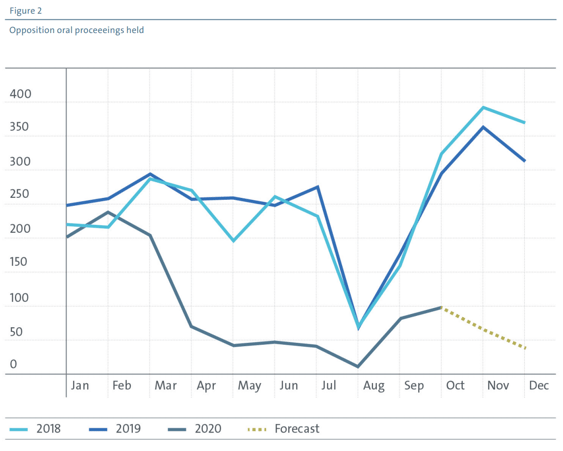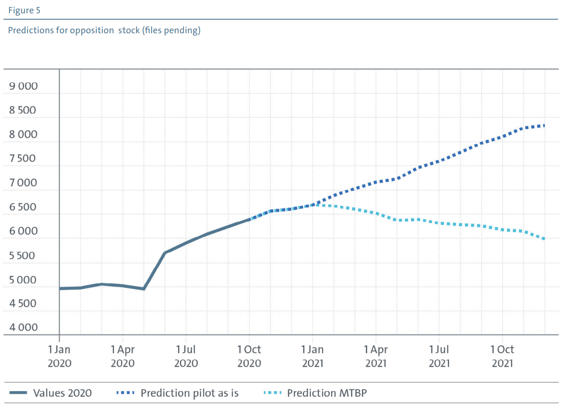UPDATE 6 APRIL 2022: On 6 April 2022, the EPO issued a notice extending its pilot project for conducting oral proceedings in opposition by videoconference (VICO) until 31 December 2022. Read the latest.
The recent announcement by the EPO of “videoconference (“ViCo”) as default” for opposition hearings will not have come as a surprise to those involved with European oppositions. The twin imperatives of timely access to justice and staying safe in the face of the coronavirus pandemic left the EPO with little choice. Here, we review the latest changes and looks ahead to the impact these will have in the coming months.
Going virtual
Back in April 2020, in the face of pandemic-induced travel restrictions and a need for social distancing, the EPO announced important changes to examination and opposition hearings (“oral proceedings”). Hearings before Examining Divisions (“EDs”) would be held by ViCo unless there were “serious reasons” preventing this[1]. For hearings before Opposition Divisions (“ODs”), the change was less drastic: in-person hearings at the EPO were postponed and ViCo offered as an alternative “with the agreement of all parties.”[2]
Coinciding with a move to working from home (WFH) for many European patent professionals, the switch to ViCo for ED hearings has generally been met with a minimum of fuss. Being non-public and typically involving a single attorney plus three-member ED, such hearings are well-suited to the ViCo format. Moreover, the “serious reasons” bar to opt out of ViCo for ED hearing was set high[3]:
“Sweeping objections against the reliability of videoconferencing technology or the non-availability of videoconferencing equipment will, as a rule, not qualify as serious reasons in this regard.”
Conversely, the optional nature of the pilot project for ViCo opposition hearings meant that no reasons whatsoever need be given to opt out.
Opposition opt-outs
It is possible to speculate on the reasons why, but uptake of the pilot project for ViCo opposition hearings has so far been low. Unsustainably so. This is starkly illustrated in the Progress Report published by the EPO[4]. From May to October 2020, the cumulative number of ViCo opposition hearings was below 250. A far cry from the figures for 2018 and 2019, which at their peak both exceeded 350 hearings in a single month.
This low uptake does not necessarily indicate a resistance to change on the part of users of the European patent system. While recording of EPO ViCo hearings is not permitted, a “taster” video clip of a mock ViCo hearing is available here. This shows Mewburn Ellis partner, Nick Sutcliffe, presenting arguments at the invitation of EPO examiner, Marion Trommsdorff. Courtesy of FICPI Digital Open Forum, Nov-20, www.ficpi.org.
The EPO’s e-learning centre is an excellent information resource on this topic. As well as guidance on procedure and technical requirements, the e-learning centre offers a recording of a mock opposition hearing conducted using the Zoom platform. This demonstrates simultaneous interpretation into English, French or German provided as an audio overlay in a three-party hearing.
The relatively low uptake of the pilot project for ViCo opposition hearings may perhaps be best explained by the adversarial nature of oppositions. In many cases, one of the parties will be in less of a hurry to have the OD reach a decision. Obtaining the necessary “agreement of all parties” therefore becomes impractical.
Getting back up to speed
Whatever the cause, the low uptake presents the EPO with a problem. Prior to the coronavirus pandemic, the EPO made great progress with its “streamlined opposition procedure.” Introduced in 2016 with the aim of concluding “straightforward cases” (which amount to around 70% of all opposition cases) within 15 months. The Mewburn Ellis report “Opposition Trends in the Life Science Sector” shows that the EPO was well on its way to achieving that goal, with a mean time to decision decreasing from 22.1 months in 2015 to 17.1 months in 2018.
The EPO’s Progress Report now shows that this progress is rapidly being undone. Figure 2 of the EPO’s report shows the number of opposition hearings held per month for the years 2018, 2019 and 2020 (November and December 2020 are forecast). The 2020 numbers are down sharply.

Source: EPO 2020 – Progress Report[5]
The implications of continuing with the optional pilot project for ViCo opposition hearings are illustrated by the dark blue dotted line of Figure 5 from the EPO’s report: the stock of outstanding opposition cases would grow throughout 2021. Conversely, by adopting the Medium Term Business Plan (MTBP; light blue dotted line) in which the number of opposition hearings is increased to 360 per month for 2021, the backlog created during the pandemic will be dealt with by 2022.

Source: EPO 2020 – Progress Report[6]
Another insight from the EPO’s report is that the effect of the pandemic on the backlog of opposition cases differs by sector. The medical and pharmaceutical sector has seen a 24% increase in outstanding cases from September 2019 to September 2020, whereas the corresponding increase for Information and Communications Technology (ICT) patents is 7%. The Mewburn Ellis oppositions report mentioned above found that patents in the medical and pharmaceuticals sector are among the most-opposed patents at the EPO and are often opposed by more than one party. This would make such cases especially vulnerable to “ViCo opt-out” delays.
Where to next?
Looking ahead, we have some points of certainty. The Decision of 10 November 2020[7] means that opposition hearings will not take place on the premises of the EPO, except in rare cases, until after 15 September 2021. The same Decision alters the pilot project for ViCo opposition hearings to remove the requirement for the agreement of all parties as from 4 January 2021. That is, “ViCo by default.”
Parties who have been summoned to on-premises oral proceedings up to 15 September 2021 can expect the summons to be changed to ViCo oral proceedings. We also know that the same “serious reasons” bar (see above) will have to be met to avoid the use of ViCo[8]. It is not certain that the ViCo hearings will be scheduled for the same date in 2021 set for the original on-premises hearing, but it seems likely that the EPO will endeavour to keep the same date where possible.
We expect the use of the Zoom platform for opposition hearings to increase. The EPO added the Zoom platform in September 2020 as an alternative to the Skype for Business platform (which is used for examination hearings) in order to permit simultaneous translation and to better handle complex multi-opponent cases. The EPO’s progress report mentions a user preference for Zoom, and the ability to view a greater number of participants on screen simultaneously is particularly helpful for multi-opponent cases.
We predict an increase in attendance of ViCo hearings by members of the public and an increase in multi-location attendance by party members. For example, in-house counsel for companies based outside Europe may join the ViCo hearing of oppositions in which they are involved or simply to observe a competitor’s case[9]. With ongoing travel restrictions, the ability to attend ViCo hearings from anywhere in the world presents a big advantage, albeit potentially at an unwelcome hour in certain time zones.
Looking beyond the pilot project’s end in September 2021, it is possible that the ViCo by default for opposition hearings will be made permanent. Even if, as we hope, the pandemic is under control by then, there are long-term benefits of ViCo to consider. A reduction in travel would align with the EPO’s environmental sustainability goals[10]. Likewise, the easier access ViCo affords for members of the public, including trainee patent attorneys, is a win for public awareness and education.
The Boards of Appeal of the EPO permit both examination and opposition appeal hearings to take place by ViCo, “only if the parties agree.”[11] The “ViCo by default” situation for first instance (ED and OD) hearings discussed above does not (yet) apply to appeals. At the date of writing, some appeal hearings continue on-premises at the EPO, others by ViCo, and still others adopt a hybrid approach with one party present at the EPO and another joining by ViCo. The Boards of Appeal of the EPO have recently opened a User Consultation on a proposed amendment to their Rules of Procedure[12]. The proposed new article would formalise the current practice of holding appeal hearings by ViCo where requested. The new article would also permit the Chair of the Board of Appeal to decide in “exceptional circumstances” that a party, representative, or accompanying person shall attend by ViCo.
Finally, the EPO’s “MTBP” goal of 360 hearings per month for all of 2021 has an obvious implication for all users of the system: we can expect a lot of activity in the year ahead. As shown above in Figure 2 from the EPO’s progress report, 360 hearings per month would mean matching the peak monthly level of 2018 and 2019 for the whole of 2021.
References
- Decision of the President of the European Patent Office dated 1 April 2020 concerning oral proceedings by videoconference before examining divisions.
- Decision of the President of the European Patent Office dated 14 April 2020 concerning the pilot project for oral proceedings by videoconference before opposition divisions.
- Notice from the European Patent Office dated 1 April 2020 concerning oral proceedings and interviews to be held by videoconference
- Opposition oral proceedings by videoconference in the context of COVID-19
- Opposition oral proceedings by videoconference in the context of COVID-19
- Opposition oral proceedings by videoconference in the context of COVID-19
- Decision of the President of the European Patent Office dated 10 November 2020 concerning the modification and extension of the pilot project for oral proceedings by videoconference before opposition divisions
- One example given by the EPO of an allowable “serious reason” is where the proceedings involve the demonstration or inspection of an object where the haptic features are essential.
- It is necessary to provide full name to the EPO in order to join a ViCo hearing as a member of the public, but that person’s identity need not be revealed to the parties. The ViCo system can simply show “Member of the public.”
- EPO Annual Review 2019: Goal 5: Secure sustainability
- Oral proceedings before the Boards of Appeal – reassessment of the measures adopted due to the coronavirus (COVID-19) pandemic, 29 July 2020
- Article 15a RPBA – online user consultation (closes 27 November 2020)
This article originally featured in the Boston Patent Law Association newsletter (Volume 51, Issue 4) released in November 2020. Read the article.
Christopher (Chris) is a Partner and Patent Attorney at Mewburn Ellis. He handles the full range of patent work in the life sciences sector, from pre-drafting advice to drafting and prosecution of worldwide patent portfolios. Chris also has experience with IP due diligence and European oppositions.
/CHRISTOPHER%20CASLEY%20author.png?width=100&height=100&name=CHRISTOPHER%20CASLEY%20author.png)

